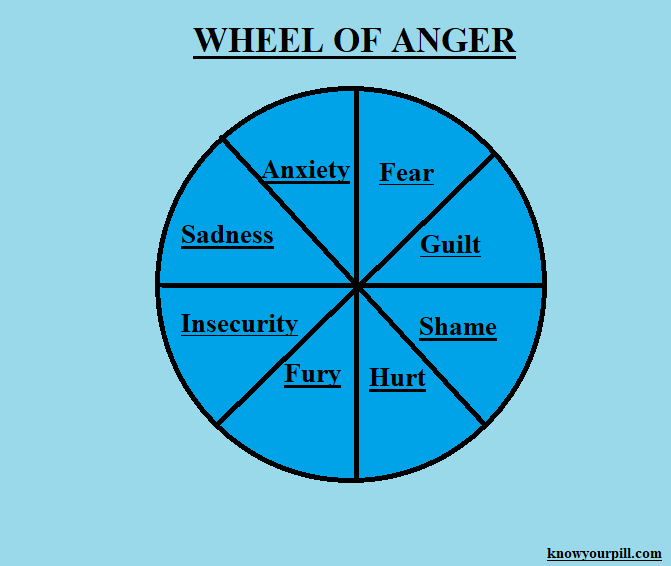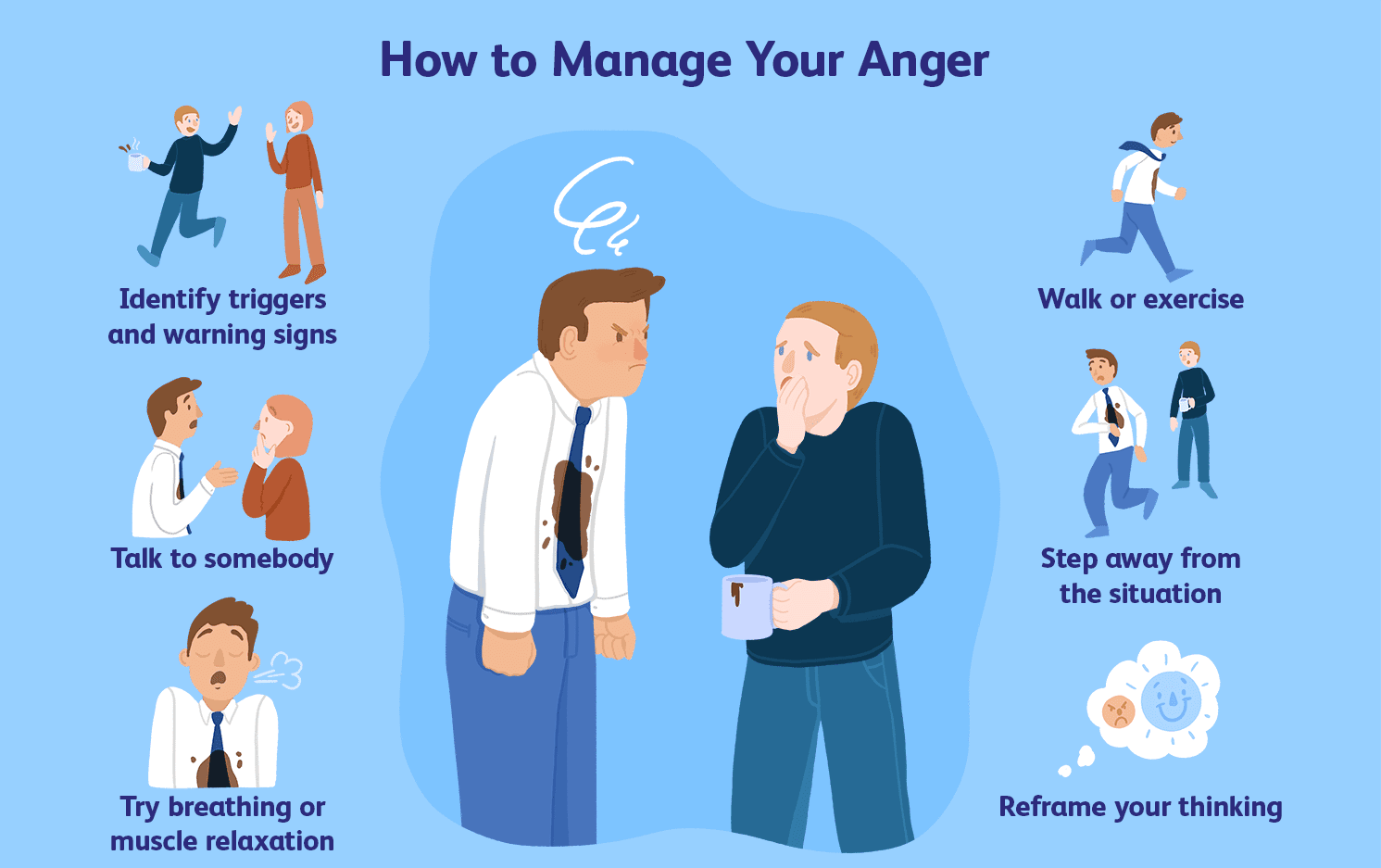
Anger Management: Looking into the dynamics of Anger Management Issue
How to deal with Anger?
Anger is an emotion that causes antagonism towards something, or someone you feel has done wrong to you. Anger can also be a good thing as it gives you a way to express your negative feelings or to motivate you to find solutions to your problems. But excessive or frequent anger can cause you issues.
Dealing with anger or anger management is vital to maintain good health and good relationships.
Anger itself is not a problem- the real question is how to deal with anger issues.

Anger is a natural process of perceived threats. It makes your body release adrenaline, tightening your muscles, and increasing your blood pressure and heart rate. However, anger becomes an issue when you don’t know how to manage it in a healthy way.
Signs of anger issues
The first step to deal with your anger effectively is to learn how to recognize when you are angry. Some physical signs of anger issues include:
- Headache
- Dizziness
- Stomachache
- Clenching the jaws
- Grinding teeth
- Rapid heart rate
- Feeling hot in the face or neck
- Shaking or trembling
Some emotional symptoms include:
- Irritability
- Sadness or depression
- Feelings of guilt
- Feeling like getting away from the situation as soon as possible
- Anxiousness
- Resentfulness
- Striking out physically or verbally
Some other signs of anger issues include:
- Pacing
- Rubbing your head
- Cupping your fist with the other hand
- Getting sarcastic
- Losing sense of humor
- Acting in an abrasive or abusive manner
- Raising your voice
- Beginning to scream, yell, or cry
- Craving drinking, smoking, or any other substance
Tests for anger issues
There are numerous online tests for anger issues. You can try any of these anger issues test to check for the anger issues you are having. Some of these tests even provide you with the causes of your anger and also a treatment for it.

Anger issues can be troublesome. They can lead to problems if you leave them unbridled. Take the anger management tests or consult a doctor if your anger is interfering with your daily life.
Severe anger issues need to be dealt with patience. A health care provider may advise you to take steps to manage your anger.
Types of anger issues
There are mainly three types of anger issues that help realize how to react in a situation that makes us angry. These types are:
Passive Anger
Many people don’t admit that they are angry as they don’t like confrontation. This type of anger is called passive anger. It comes out in things like procrastinating, becoming silent when you are angry and pretending that everything is fine.
Open Anger
Contrary to passive anger, many people have a tendency to lash out in rage or anger, become verbally or physically aggressive, and at times hurt themselves or others. It is known as open anger. It comes out in bullying, fighting, accusing, blackmailing, bickering, shouting, criticism, or sarcasm. This type of anger comes out from a need to be in control.
Assertive Anger
The most beneficial way to deal with anger is by being confident and controlled, listening and talking, and open to help in dealing with such situations. This is assertive anger, which can help you to grow.
How to deal with anger issues?
Here are 8 tips which you can follow to manage your anger:

-
Think before you speak
It’s easy to say something in the heat of the moment and regret it later. Take a couple of moments to collect all your thoughts before you say anything.
-
Once calm, you should express your anger
As soon as you start thinking clearly again, try to express your anger and frustration in an assertive and nonconfrontational way. State your needs and concerns directly and clearly, without hurting the feelings of others.
-
Get some regular exercise
Physical activities reduce the stress that causes you to become angry. If you feel that your anger is escalating, go for a run or a brisk walk, or spend your time doing other enjoyable physical activities.
-
Take periodical timeouts
Timeouts are for everyone, not just for kids. Take short breaks or timeouts during the times of the day that are more stressful. A few quiet moments might help you feel much better and prepared to handle situations ahead without getting angry or frustrated.
-
Identify solutions
Rather than focusing on what made you angry, work on resolving the issue. Always remind yourself that your anger won’t solve any problem and might only make it even worse.
-
Don’t hold grudges
Forgiveness is the best tool. If you allow negative feelings such as anger to build up inside you, they will crowd up all the positive emotions, thus making you bitter and unhealthy. You should learn to forgive instead of holding a grudge, which can have a negative impact on your mind and relationships.
-
Use humor
You can diffuse tension by lightening up. Use humor to help ignore what makes you angry. Also, try to avoid sarcasm as it can hurt feelings and make things worse.
-
Practice relaxation
Put your relaxation skills to work when your temper flares. Practice deep-breathing, repeating a calming phrase or word, imagining a relaxing scene, writing in a journal, doing a few yoga poses, or listening to your favorite music- whatever it takes to make you feel relaxed.
Anger management issues
There are several common triggers for anger, such as losing your patience, feeling of injustice, or feeling that your opinion is not appreciated. Other causes of anger include worrying about personal problems or memories of traumatic events.
You may also have unique anger triggers, based on many different factors, such as your reactions to a particular situation or your personal history feed.
Brain chemistry, inherited tendencies, and underlying medical conditions also play an important role in your tendency towards anger and your anger management issues.
If you do not manage your anger correctly, it can also be harmful to your health. Some research suggests that keeping your anger pent up or inappropriately expressing your anger can do a lot of harm to your physical and mental health.
Suppressing anger makes chronic pain worse while expressing your anger reduces pain. There is also evidence that demonstrates that anger and hostility are linked with high blood pressure, heart diseases, peptic ulcers, and stroke.
